At #14: A visit to Calakmul
A visit to the Mexican archeological site of Calakmul is a MUST for every admirer of the Maya civilization. Certainly because the place was in its time one of the most beautiful & powerful cities in the region.
Calakmul was the biggest arch rival of Tikal. Another Maya site which is located nearby, although on the Guatemalan side of the border with Mexico nowadays. Both sharing the Petén jungle.
- The border with Guatemala is only 35km/22mi away from Calakmul. The distance to Tikal is 128km/79mi – as the crow flies.
As you will notice soon enough when you visit Calakmul, the jungle around looks like a vast green sea. Officially called the Calakmul Biosphere Reserve. Another similarity it shares with Tikal, which is also located within a National Park.
- The Calakmul Biosphere Reserve was established in 1989 & is home to a diverse range of flora and fauna. Including jaguars, tapirs, spider & howler monkeys, toucans, wild turkey, parrots & many other animals.
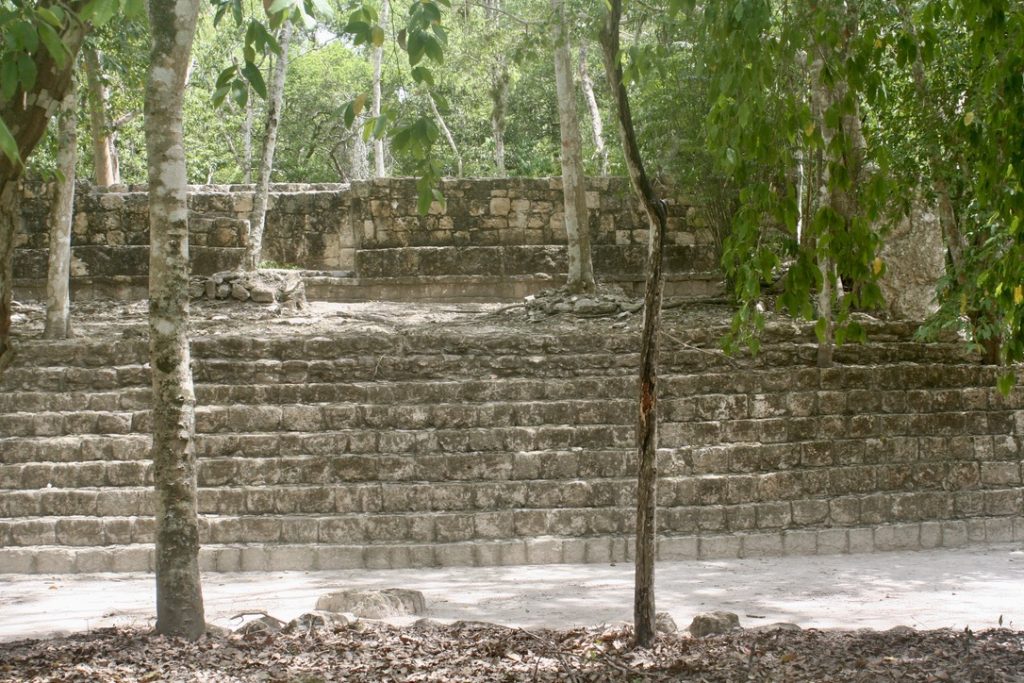
A short history of Calakmul
Although Calakmul’s history goes way back, the city had its heyday during the Classic period of the Mayas. More specifically, between 500 and 900 AD.
From the moment the city became powerful, it started to rival Tikal. Sometimes winning a battle, other times losing one. Acting as two superpowers, these two cities fought each other permanently for power & influence.
At its height Calakmul had a population of aproximately 50,000 inhabitants. The city itself covered an area of 70 km²/ 27 square miles. Meanwhile reigning over a much bigger area, with at least four times as many inhabitants.
- Calakmul is a modern name. In ancient times the city was known as Ox Te’ Tuun. A Maya name meaning “Three Stones”, which probably refers to Calakmul’s highest pyramid (Structure II, height 45m/148ft).
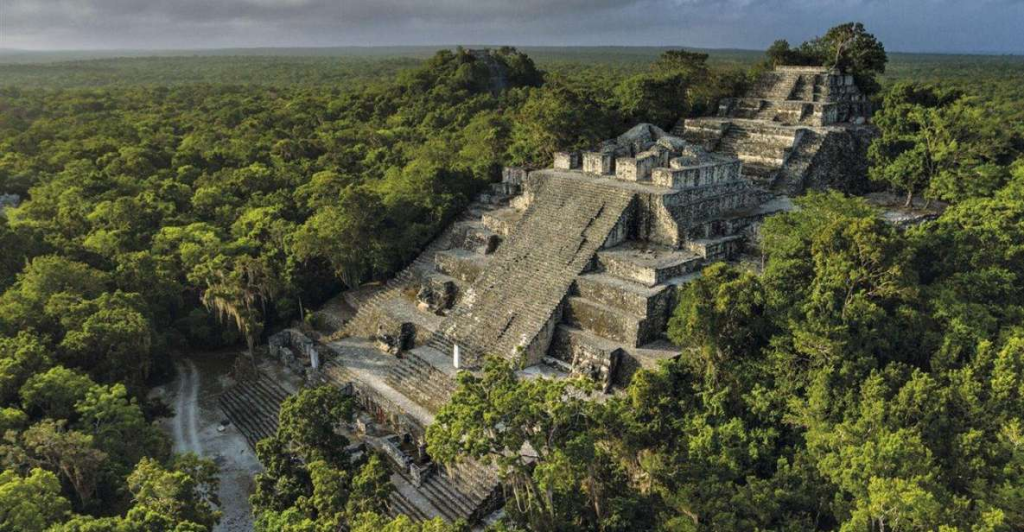
Both Calakmul and Tikal were constantly trying to get as many alliances as possible with neighboring cities. Causing local conflicts all around, like the rivalry between:
All unique places, playing their own role in the Classical Maya World. All beautiful sites which are well worth your visit.
- I’ve visited them all. Many of them several times. The only exception is Piedras Negras, located on the Guatemalan side of the Usumacinta River.
The rediscovery of Calakmul
Calakmul was (officially) rediscovered from the air by the North-American biologist Cyrus L. Lundell in 1931. He gave the site its modern name.
At the time Lundell was working for the Mexican Exploitation Chicle Company. On the lookout for the sapodilla tree, which produces the gum for “chewing gum” – highly popular then & now.

- The whole Petén jungle at the time was a working area for the so-called “chicleros“. Men in search of the mentioned tree. While exploring the area, it’s highly probable they found the lost Maya cities of the Petén jungle first, including Calakmul.
As soon as the famous North American archaeologist Sylvanus G. Morley of the Carnegie Institute in Washington – working at Chichén Itzá at the time – learned about the discovery, he decided to visit Calakmul and have a first look. Serious excavation & research of the site however would only begin in the 1980s.
An enormous Maya site
Although an enormous site, many temples in the ceremonial center have been excavated & investigated since then. Giving us back Calakmul’s unique history, little by little. Including many names of former rulers.
- Besides occupying an enormous surface area, many temples in Calakmul’s center are also large, sky-high structures.
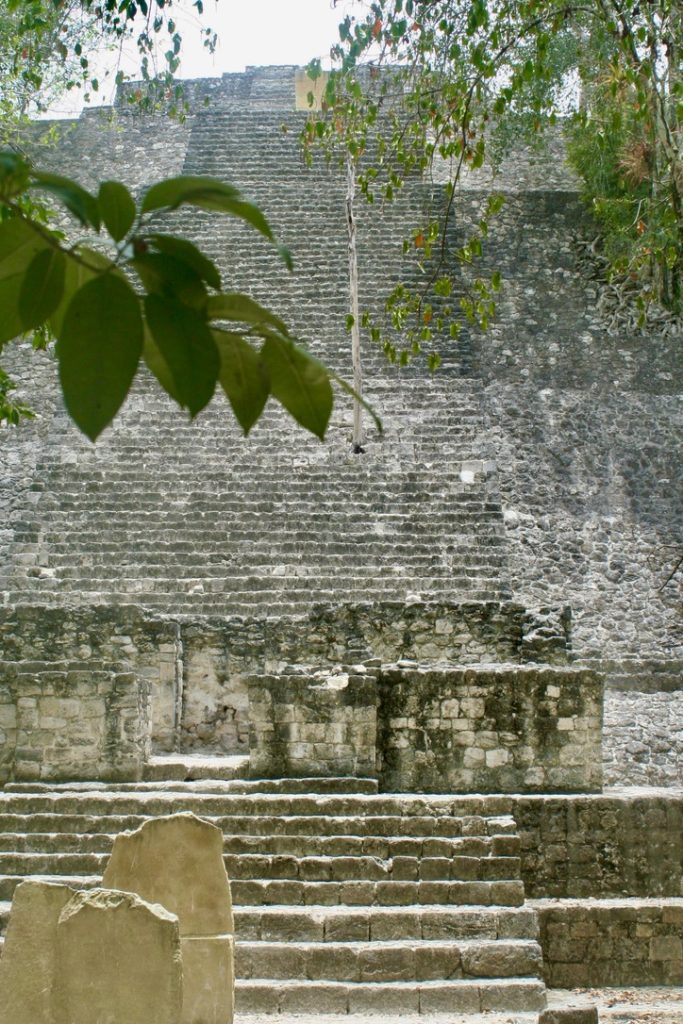
In Calakmul were found over a hundred stelae. Unfortunately most of them have suffered more than elsewhere – even Tikal – and are almost undecipherable nowadays.
- The main reason the stelae suffered so much, is the fact that the sculptors used or had to use a soft kind of limestone. As a consequence most stucco artwork is lost to history – including most inscriptions – because of the rain. Something you will observe soon enough when you visit Calakmul.
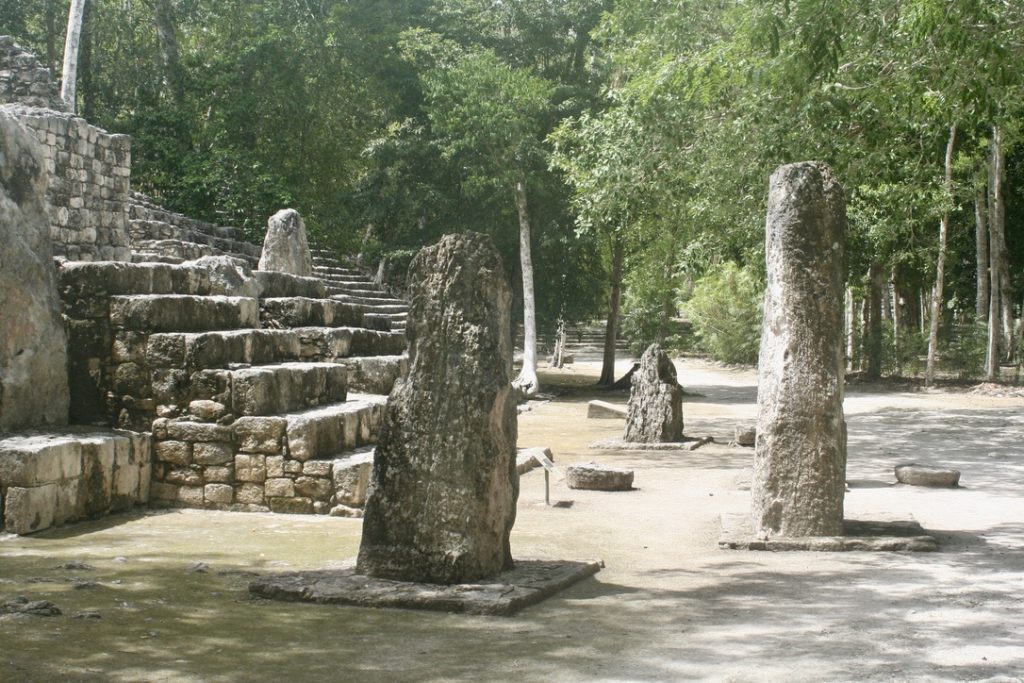
- Other stelae though were deliberately stripped of their frontal piece. Most probably by looters, who sold them to the highest bidders.
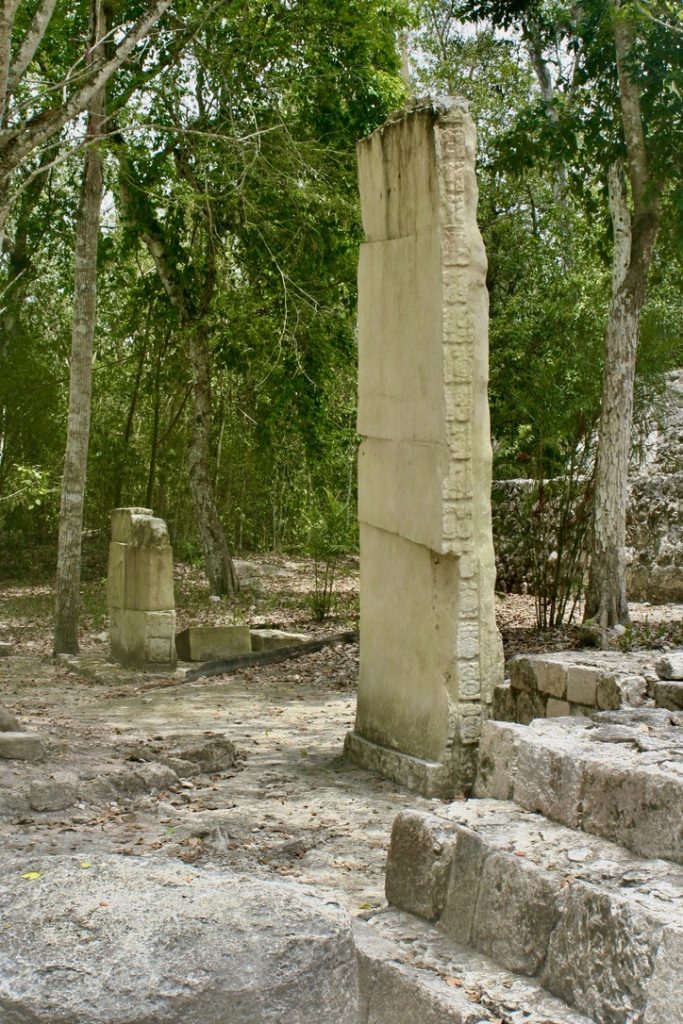
Ironically, but fortunately, one of these “stolen” pieces – Stela 51 – ended up in the National Museum of Anthropology in Mexico City. Still giving us an idea of the beauty of the original stelae of Calakmul.
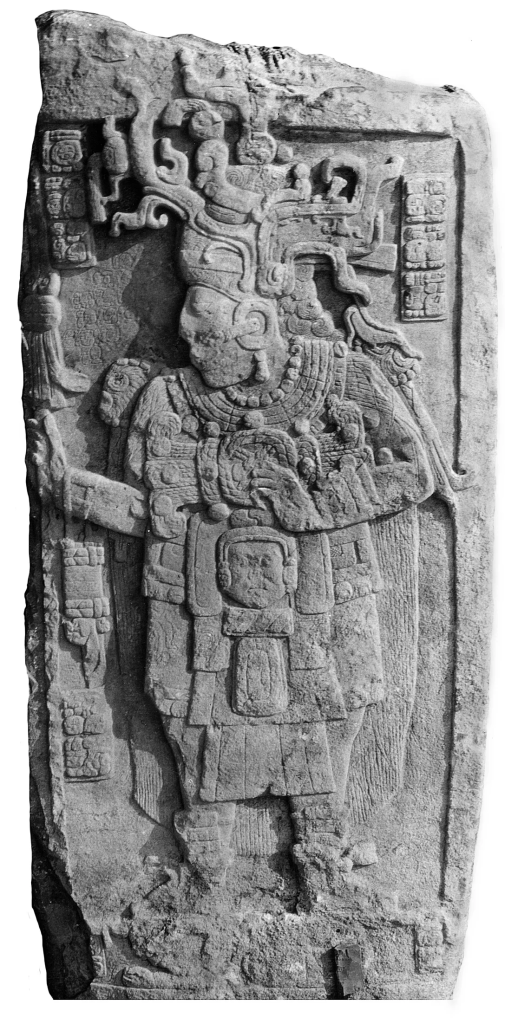
A visit to Calakmul
To be totally honest, Calakmul – for me – wasn’t as impressive as its arch rival Tikal, but also unforgettable. I soon felt the city’s importance in Maya history & was impressed by its green surroundings. Still hidden in the Petén jungle. A wildlife attraction in itself.
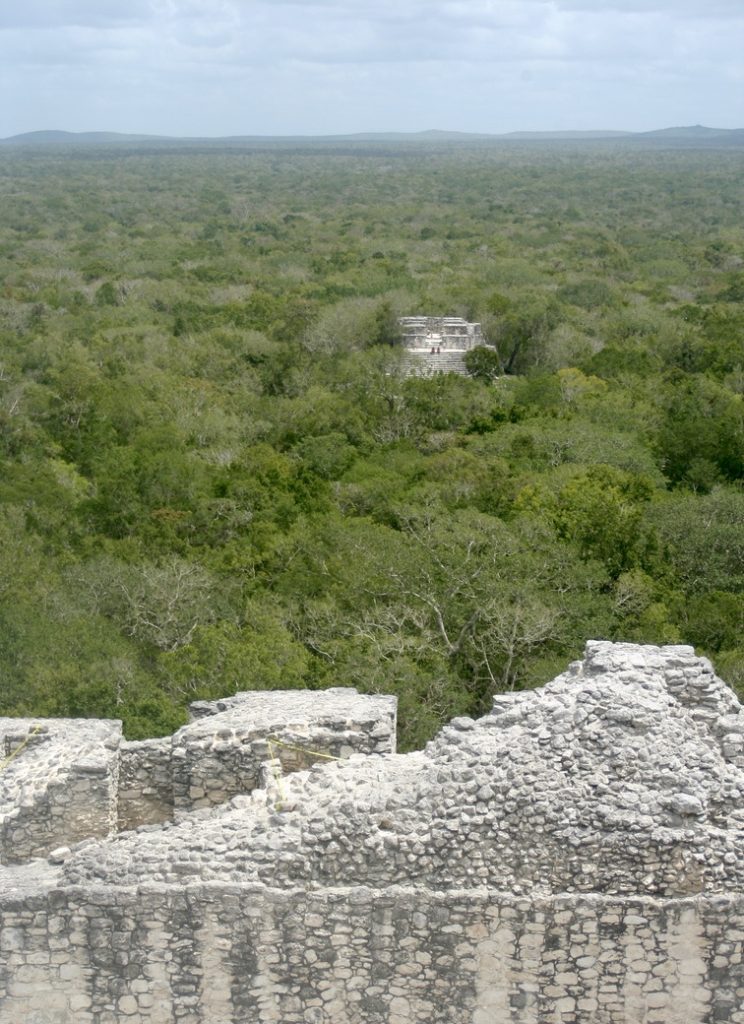
TravelTip: As in Tikal or for example Cobá, the distances between the temples are considerate. So prepare yourself for a long, but beautiful & inspiring walk.
Visit Calakmul – Getting there
Because of the fact that the temples of Calakmul lay hidden in a vast jungle, it isn’t easy to reach the site.
- You’ll find the entrance to the Biosphere on Highway 186 – Carretera Federal – which connects Chetumal and Escárcega. The turnoff is 56 km/35 mi west of Xpujil, 3 km/ 2 mi distance from the small village of Conhuás. From there, it’s still over an hour drive to the temples of Calakmul. A good, but long & winding road.
Coming from Palenque – a 6 hour drive – we planned to stay the night near Xpujil. This made it possible for us to visit the site as early as possible. But also to continue our journey the same day of our visit to Calakmul & be in time in Bacalar, our next destination.
- In the near future, reaching the Calakmul may get somewhat easier, when the Tren Maya is finished. Originally it was planned to build a train station near the site, but fortunately – thinking about Calakmul’s ecosystem -this didn’t happen. Actual plans are to lay the railway closer to the mentioned highway. Meaning, you still have to travel the long & winding entrance road.

Other Maya sites nearby
TravelTip: As stated above, we only stayed one night in the neighborhood of Calakmul. However, if you have the time I’d highly recommend you to stay a few nights longer. Mainly because there are some other interesting Maya sites nearby. To name a few: Balamkú, Chicanná, Becán & Xpujil. All located much closer to Highway 186.
The presence of so many other sites in the area anew indicates how big the Maya World once was. Certainly in the central area of the Petén jungle & on the rest of the Yucatán Peninsula.
- Just recently a group of students discovered a new city in the same area & and named it Valeriana.
- They found this site studying photos taken by LiDAR (Light Detection and Ranging). A method that uses laser light to measure distances to objects on the ground. This way creating detailed 3D maps of the Earth’s surface, including old traces of overgrown past constructions.
In short, I have to get back (!) to the fascinating area around Calakmul as soon as possible.
Visit Calakmul – On a tour
When not staying nearby, there’s still the option to visit Calakmul from other popular destinations on the Mexican peninsula. Even from Palenque in the neighboring state of Chiapas.
Just click on one of following guided tour options, from:
- Tour to Calakmul from Xul-Ha, Bacalar or Chetumal (12 hours)
- From Campeche (15 hours)
- Or, From Palenque (15 hours)

Visit Calakmul – Where to stay
Xpujil
The biggest place near the entrance to the Biosphere of Calakmul is Xpujil – also, Xpuhil. A city that has its own Maya ruins & several hotels to stay.
- From Xpujil it’s a 2 hour drive to Calakmul.
We stayed at Casa Kaan. An excellent hotel – actually it’s more like an inn, with several lovely, private cabins (besides a reception & a good restaurant).

To learn more about this hotel/inn, click on: Casa Kaan, Xpujil
Palenque
When staying in Palenque, I’d like to recommend the Hotel Maya Tulipanes. A good, clean hotel, with a godly swimming pool.
- We stayed at the Maya Tulipanes for 4 nights, using it as a base to explore the area & visit the Maya sites of Palenque (twice!), as well as a long day-trip to Yaxchilan & Bonampak.

To learn more about this hotel, click on: Hotel Maya Tulipanes
Bacalar
After our visit to Calakmul, we continued our journey, ending up in Bacalar.
- Our stay in Bacalar was mainly planned to have a break from visiting too many Maya sites. To relax a little at the heavenly blue lagoons surrounding this special place – mainly popular amongst Mexicans.
- Instead of “relax a little”, it ended up being a perfect, unforgettable day spent at La Playita, Bacalar. Combining a beautiful environment, excellent food & a more than friendly service. In a few words, highly recommended.
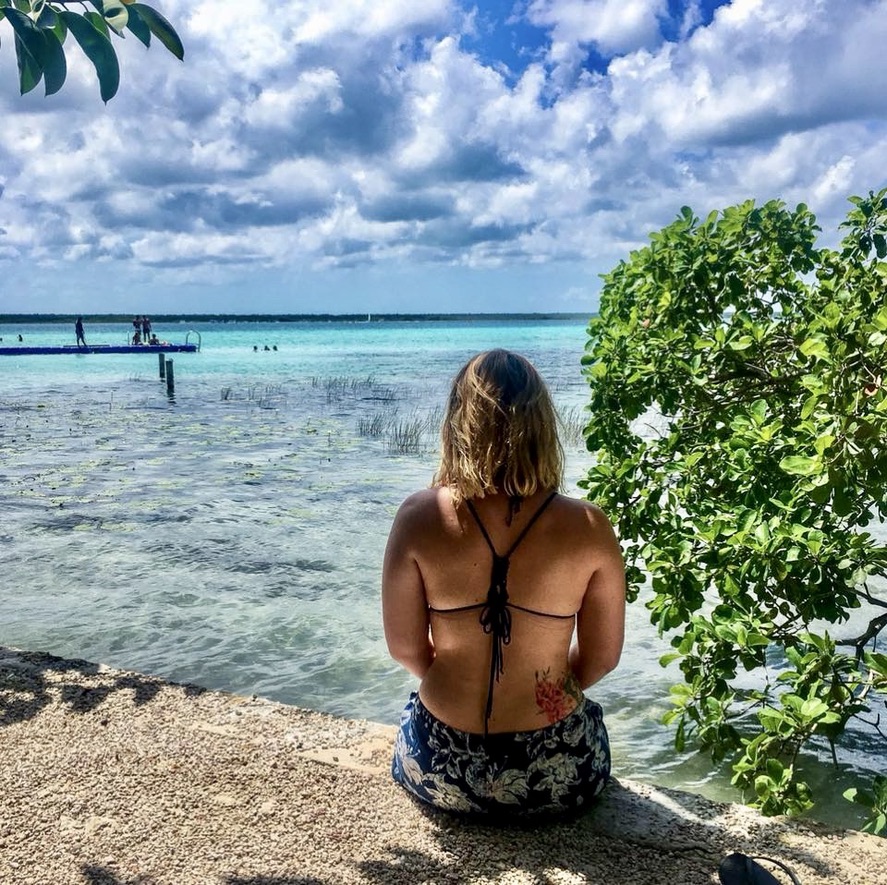
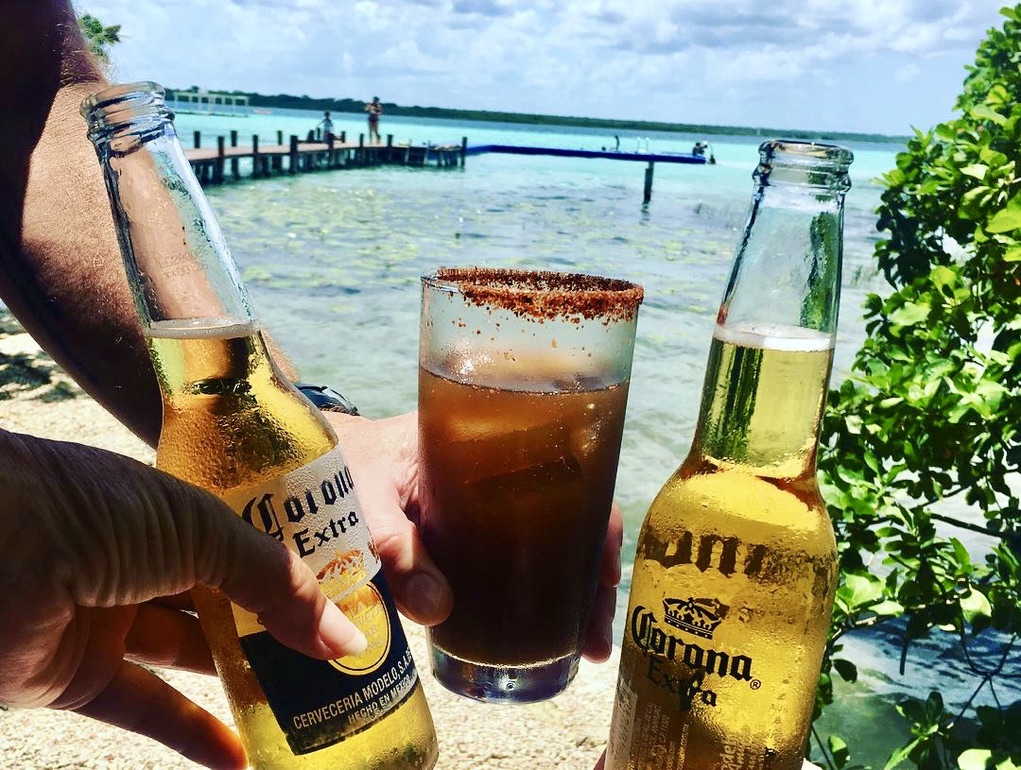
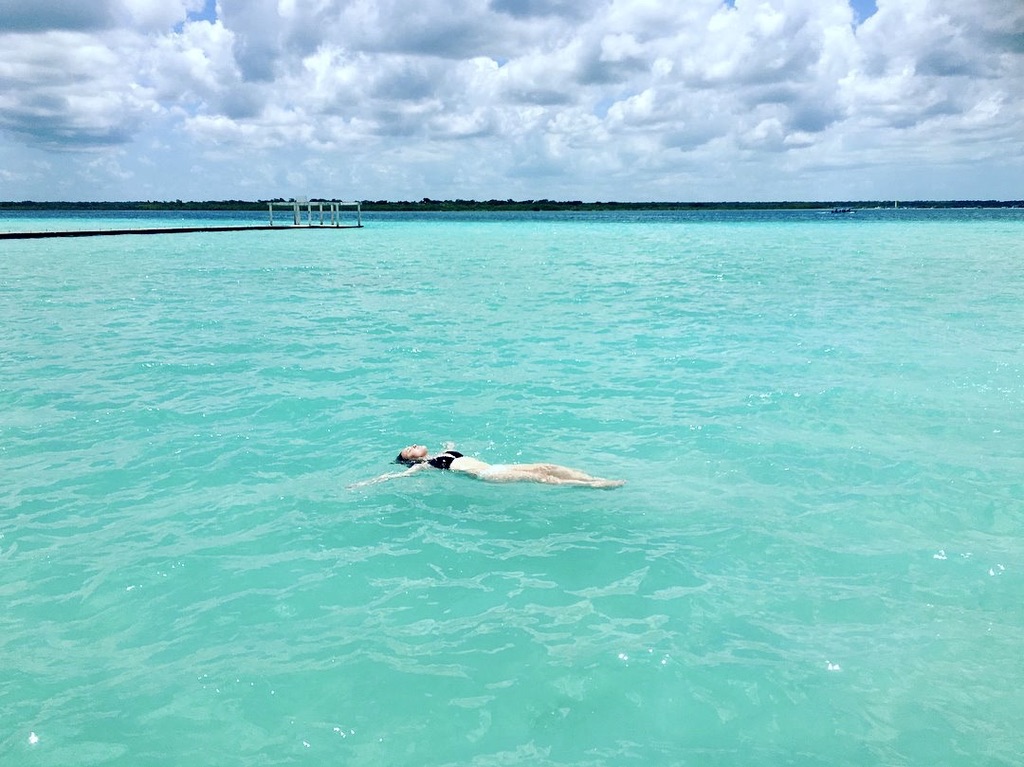
Impressions of our visit to La Playita Bar & Restaurant, Bacalar.
The hotel in Bacalar we stayed at: Hotel Azul 36. Again an excellent hotel, perfectly located, with a welcome swimming pool (although you can do without, if you plan to visit Bacalar’s blue lagoon).

To learn more about this hotel/inn, click on: Hotel Azul 36, Bacalar
Some last photo impressions of Calakmul


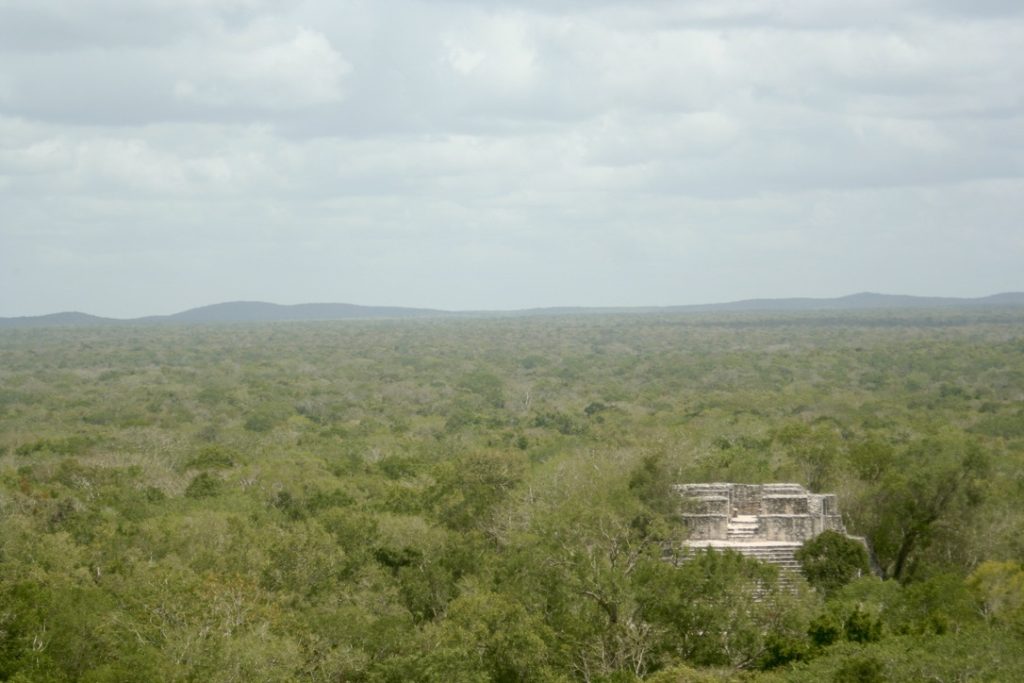
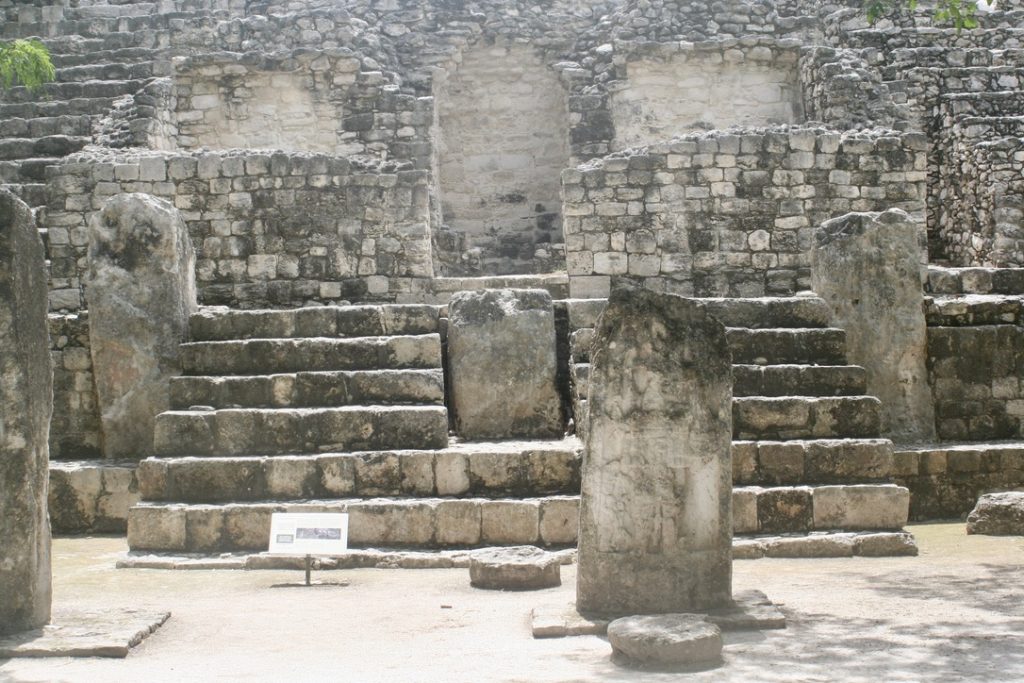
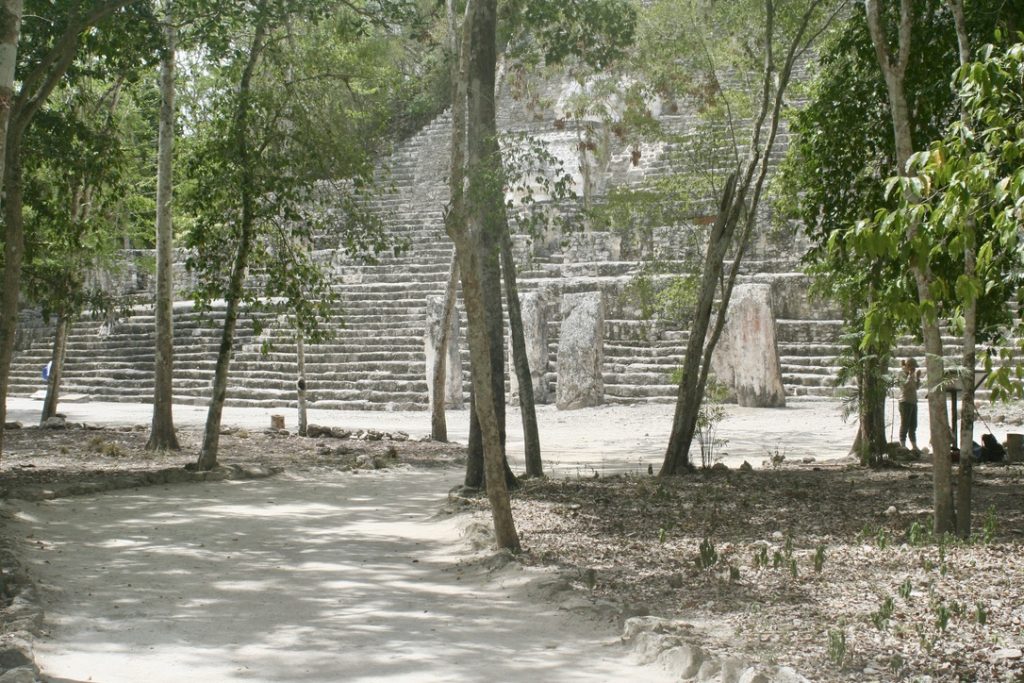
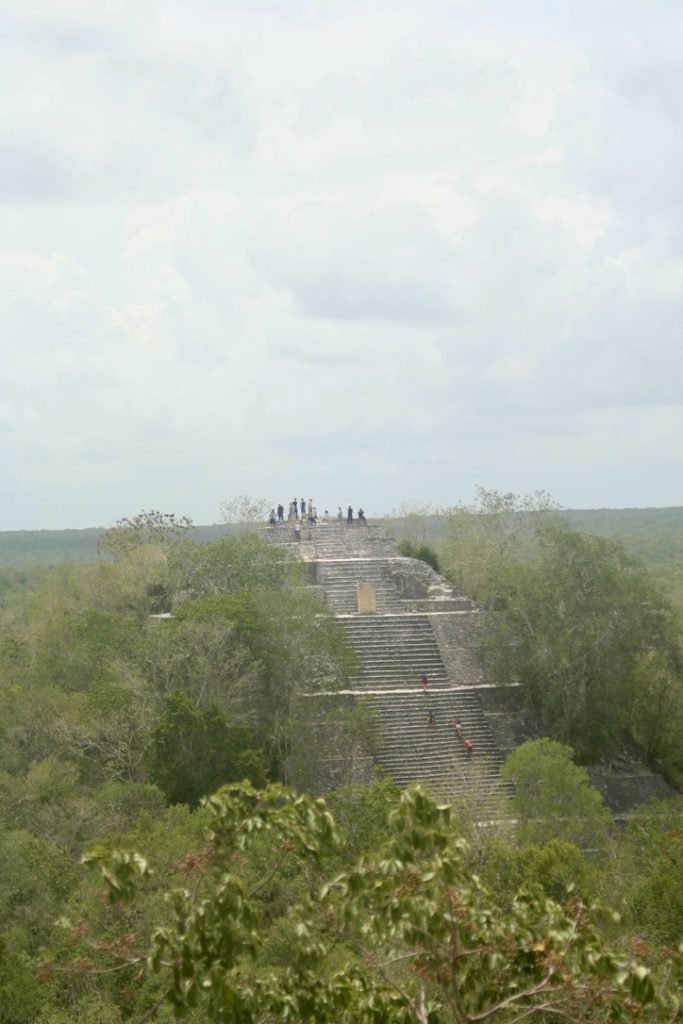
Overview of My Top #15 Maya sites
Click on their name to go to the respective post:
1. Copán, Honduras
2. Yaxchilán & Bonampak, Chiapas, México
3. Tikal, Guatemala
4. Palenque, Chiapas, México
5. Quiriguá, Guatemala
6. Kabah & Labná, Yucatán, México
7. Ek Balam, Yucatán, México
8. Yaxhá, Guatemala
9. Uxmal, Yucatán, México
10. Toniná, Chiapas, México
11. Cobá, Yucatán, México
12. Chichén Itzá, Yucatán, México
13. Tulum, Yucatán, México
14. Calakmul, Yucatán, México
15. Muyil, Yucatán, México (under construction)
For an overview of my personal favourites, go to: Top #15 Maya-sites
For an overview of all travel posts of my blog, go to: My Home Page

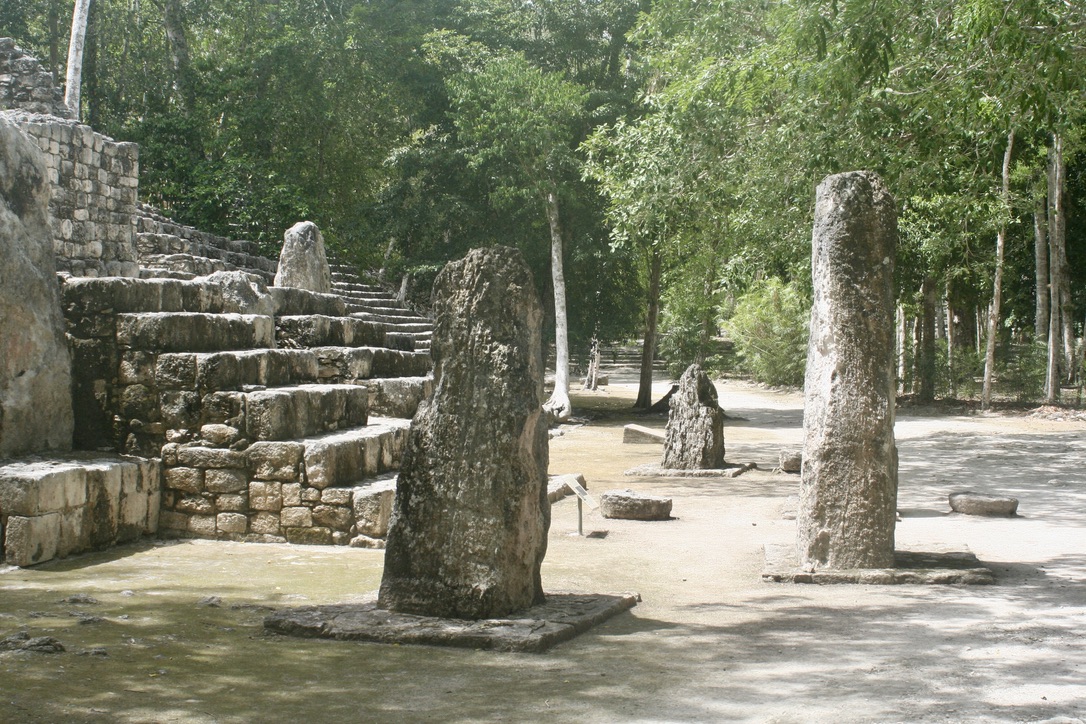
Comments
3 responses to “Visit Calakmul: The Best Tips & Ideas for this beautiful Maya site”
[…] Visit Calakmul: The Best Tips & Ideas for this beautiful Maya site […]
[…] Visit Calakmul: The Best Tips & Ideas for this beautiful Maya site […]
[…] Visit Calakmul: The Best Tips & Ideas for this beautiful Maya site […]